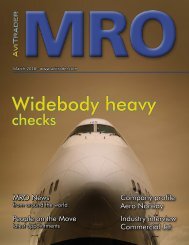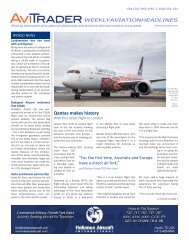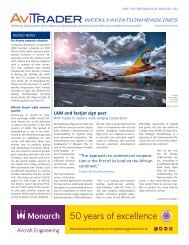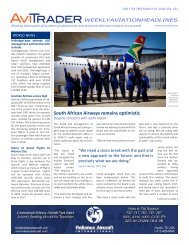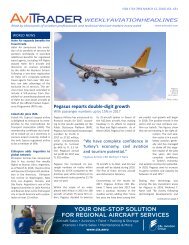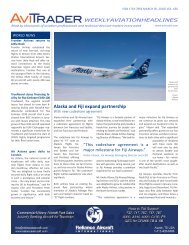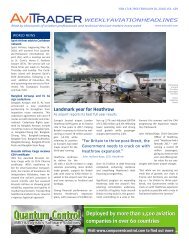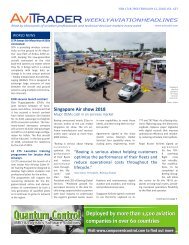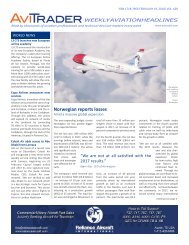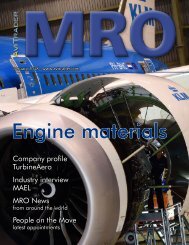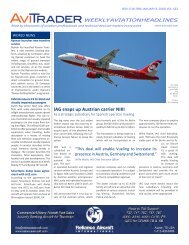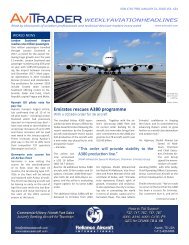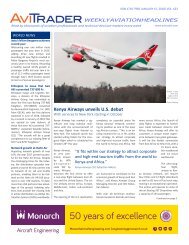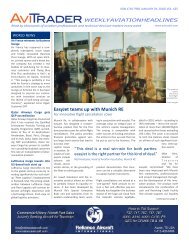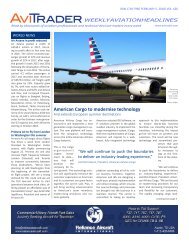AviTrader_Monthly_MRO_e-Magazine_2017-12
AviTrader_Monthly_MRO_e-Magazine_2017-12
AviTrader_Monthly_MRO_e-Magazine_2017-12
You also want an ePaper? Increase the reach of your titles
YUMPU automatically turns print PDFs into web optimized ePapers that Google loves.
Industry report<br />
25<br />
MTU expects its commercial maintenance business to continue growing faster than the market.<br />
Photo: MTU<br />
been €485 million instead of €503 million. Other changes concern<br />
the definition of order backlog. Apart from the effect of the amended<br />
IFRS 15 reporting standard, the growing number of engines covered<br />
by long-term service agreements will also be included. However, the<br />
new definition leads to an almost unchanged order backlog of €14.3<br />
billion for 2016 (2016 reported: €14.2 billion).<br />
In the consolidation phase from 2019 onward, MTU expects its commercial<br />
maintenance business to continue growing faster than the<br />
market. At the same time, MTU expects a shift away from independent<br />
maintenance to the <strong>MRO</strong> services within the OEM service networks.<br />
“To minimize the impact of these changes on our earnings, we are focusing<br />
on best-cost locations when expanding our <strong>MRO</strong> capacity. The<br />
latest example is EME Aero, our joint venture with Lufthansa Technik for<br />
the maintenance of Geared Turbofan engines, which will be based<br />
in Poland,” reports Chief Program Officer Michael Schreyögg. “At the<br />
same time, we are continuing to expand our portfolio of repair and<br />
maintenance services, with a view to better satisfying customer needs.”<br />
As far as the production activities are concerned, MTU expects the unprecedented<br />
growth of the Geared Turbofan programmes to reach<br />
a peak in 2018, at the beginning of the consolidation phase. “After<br />
significantly increasing throughput in recent years, we expect growth to<br />
normalize during the consolidation phase,” says MTU COO Dr. Rainer<br />
Martens. His optimism is based on the high order backlog and MTU’s<br />
excellent market position.<br />
The military engine business, which has been declining recently, can<br />
be expected to grow again from 2020 onward and reach a level of<br />
around €500 million by 2027. “The prospects in this sector are more<br />
of a long-term nature,” says Schreyögg. Future sales are most likely to<br />
arise from export deals under existing programs such as the EJ200 Eurofighter<br />
engine or the TP400-D6 for the A400M military transporter,<br />
and from new engines such as the T408 for the CH-53K heavy-lift<br />
transport helicopter or engines for a next-generation weapon system.<br />
From the mid-2020s onward, MTU expects the development of new<br />
aircraft. As in the previous investment phase, this will give MTU the<br />
opportunity to further expand its market position. “To optimize our positioning,<br />
we are constantly building up our expertise and our competencies<br />
as technological leaders,” says Lars Wagner, MTU’s new COO<br />
as of January 2018. “We are intensively working on our technology<br />
roadmap, use our experience from the Geared Turbofan programs<br />
and promote a culture of innovation”.<br />
One of the ways in which MTU utilizes its innovative strength is by reorganizing<br />
its business units in such a way that they can draw maximum<br />
benefits from modern-day digital technologies. Unlike companies in<br />
other sectors of industry, digitalization will not fundamentally change<br />
MTU’s business model.<br />
<strong>AviTrader</strong> <strong>MRO</strong> - December <strong>2017</strong>



